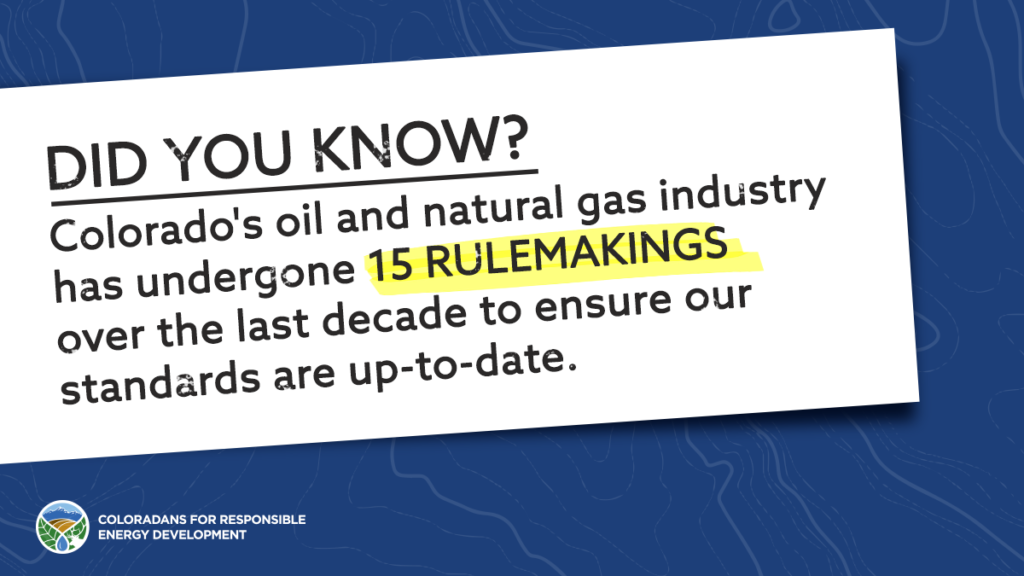Yes! Colorado’s strict oil and natural gas regulations are among the toughest in the country.
From start to finish, everything is carefully planned and monitored according to state and local laws. Just in the last decade, Colorado’s oil and natural gas industry has undergone 15 rulemakings to ensure our regulations are up-to-date with the latest technological innovations.
Colorado’s first-in-the-nation regulations include groundwater testing and monitoring, setbacks from buildings, installing noise barriers during drilling operations, and re-routing or reducing truck traffic away from communities.
In 2014, Colorado approved the nation’s first-ever regulations of methane. And, after new methane emissions regulations led by the energy industry were adopted in 2021, The Colorado Sun said that the “first-in-the-nation” rules slashing emissions “relied on compromise” with support from “a wide range of local governments.”
The Bureau of Land Management has also said that Colorado, “leads the nation in providing a regulatory framework to manage [oil and gas] development in an environmentally responsible manner.”
"The State of Colorado leads the nation in providing a regulatory framework to manage this development in an environmentally responsible manner."
—U.S. Bureau of Land Management (BLM.gov)
Learn more about Colorado’s strong methane emissions regulations here.
And thanks to recent technological innovation and leadership across the industry, Colorado has cut emissions in the Denver Metro/North Front Range region by nearly 50% in recent years and CO2 emissions in the U.S. are down 750 million metric tons since 2005. In fact, former Colorado Governor John Hickenlooper has said that, Colorado “brought environmentalists and oil and gas companies to the table to create the toughest methane emission laws in the country.” In fact, the U.S. Energy Information Administration has said that, “increasing use of natural gas has helped reduce overall U.S. CO2 emissions growth.”
"Increasing use of natural gas has helped reduce overall U.S. CO2 emissions growth."
—U.S. Energy Information Administration (EIA.gov)
In 2019, Colorado expanded our state’s already strong regulations to further support local authority and control. This ensures that Colorado’s energy industry continues to operate in the most responsible way possible.
Who regulates fracking in Colorado?
By state law, the Colorado Oil and Gas Conservation Commission (COGCC) regulates the development and production of all oil and natural gas resources in the state of Colorado.
Check out how Colorado’s strict regulations promote responsible oil and natural gas development across our state:
"Colorado has become a leader in America’s energy revolution since the turn of the century; as production has quadrupled, while emissions have been reduced by 50 percent. By working together, our way has become a model for the nation. We should strive to keep it that way."
—Lynn Granger, Colorado Petroleum Council (Colorado Sun, 2019)
Colorado’s lakes, reservoirs, and streams make our state beautiful—and more importantly, nourish our wildlife and supply our communities with water. When it comes to protecting our water, stringent regulations keep Colorado’s water clean while ensuring we can still responsibly access our state’s vast energy resources. Furthermore, Colorado’s stringent regulations mean our state’s 23 million acres of public land remain protected and free for Coloradans to enjoy.
In fact, scientists and researchers from governmental organizations, universities, and nonprofits confirm that fracking does not contaminate groundwater. Numerous independent studies have been published showing time and again showing that fracking does not contaminate groundwater.



